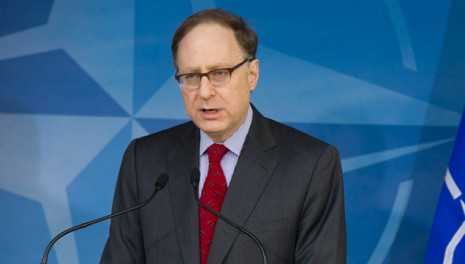“NATO and Russia: Why Transparency is Essential”
Szöveg: nato.int | 2016. augusztus 18. 9:00This op-ed was originally published by Frankfurter Algemeine Zeitung on 16 August 2016.
The fact is that Russia’s illegal and illegitimate annexation of Crimea and its ongoing support of separatists in eastern Ukraine have rocked the European security order we have all taken for granted for so long. For the first time since 1945, a European power has sought to change international borders by force.
In recent months, we have also seen new permanent deployments all along Russia’s western border with NATO Allies, from the Barents to the Baltic Sea, and from the Black Sea to the Mediterranean. There are currently an estimated 300,000 Russian troops based in its Western Military District, and in May, Russian Defence Minister Sergey Shoigu announced the deployment of three further divisions, meaning an additional 30,000 troops. These forces are backed by new air bases, naval forces and nuclear-capable short-range missiles.
We have also seen a series of massive military exercises. These have included unannounced, “snap" exercises, in some cases exceeding 100,000 troops – more than double the size of even the largest NATO exercise since the Cold War. Russia has also irresponsibly buzzed NATO ships and aircraft with its combat planes.
Meanwhile, Russia’s decision to suspend implementation of the Conventional Forces in Europe Treaty and its dismal record of implementing the other long-standing international security agreements – which Russia has signed up to – such as the Vienna Document, the Open Skies Treaty, and the Helsinki Final Act, have helped raise tensions to a level not seen since the 1980s.
NATO’s response has been robust and transparent. At the recent NATO Summit in Warsaw, the Alliance announced the deployment, by rotation, of four multinational battalions in Estonia, Latvia, Lithuania and Poland, totalling several thousand troops. This is a clear demonstration of Allied solidarity and determination to defend NATO territory against any possible aggression.
Despite claims by the Kremlin, these steps are a proportionate, sober and measured response to Russia’s actions.
A number of longstanding agreements exist to regulate the military actions of all the states in the region – Russia and NATO’s 28 member states among them – including the conduct of large-scale exercises. Chief among these are the Vienna Document, agreed by all 57 Organization for Security and Cooperation in Europe (OSCE) member states, and the NATO-Russia Founding Act – signed in 1997 in a spirit of mutual cooperation.
For years, NATO Allies have called on Russia to engage constructively to modernise the Vienna Document. We need to set a lower limit on exercises that require advance notification and observation, and close the loophole for no-notice “snap" exercises.
We also need to increase military transparency, and so help prevent incidents or accidents spiralling out of control. Unfortunately, aside from a welcome but narrow proposal on air safety in the Baltic Sea it made last month, Russia has refused to engage on these issues, instead accusing NATO itself of being the aggressor.
In fact, Moscow has gone so far as to accuse NATO of violating an important part of the 1997 NATO-Russia Founding Act related to new permanent stationing of forces. It’s called the “Substantial Combat Forces" pledge, and while it may sound like an obscure point, it represents yet another attempt by Russia to falsely raise doubts over the legitimacy of NATO’s actions.

Back in the 1990s, I was part of the US delegation that helped negotiate the NATO-Russia Founding Act – and the Substantial Combat Forces pledge in particular. That pledge stated that in the then “current and foreseeable security environment" NATO would “carry out its collective defence and other missions by ensuring the necessary interoperability, integration, and capability for reinforcement rather than by additional permanent stationing of substantial combat forces."
NATO has taken great care to uphold both the letter and the spirit of this pledge. NATO never agreed to a specific definition of “substantial combat forces", but official statements by Russia at the time proposed a limit of one brigade per country. The four battalions spread across four eastern Allies agreed by Alliance leaders at our recent Warsaw Summit, plus the additional bilateral deployments by the US under the European Reassurance Initiative, are well below even those proposed definitions.
Any accusation that NATO is violating the Founding Act, or breaking its promises, is therefore untrue. In 1997, the number of Allied forces stationed in other NATO countries was around 100,000 – already far fewer than at the end of the Cold War. Even accounting for new deployments agreed in Warsaw, next year that number will be fewer than 75,000. In the same two decades, Russian forces along NATO’s borders have increased substantially.
NATO exists to keep the almost one billion citizens of the Alliance safe. It has done this for almost seventy years by acting in a defensive, proportionate and wholly responsible way. This is, and always will be, how NATO conducts itself.
At the same time, Russia is NATO’s biggest neighbour and, historically, a country with which we have cooperated widely. The NATO-Russia Founding Act, agreed in more optimistic times, spoke of a “shared commitment to build a stable, peaceful and undivided Europe, whole and free, to the benefit of all its peoples". That is still NATO’s goal.
But, for that to be possible, Russia’s behaviour must change – in Ukraine and beyond. As part of that, Moscow urgently needs to participate in the OSCE’s talks to update the Vienna Document.
Europe – and the world – need a Russia committed to transparency, cooperation and dialogue. Vienna would be a good place to start.